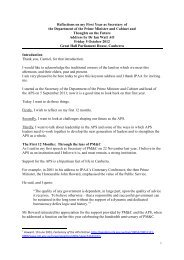Cabinet Handbook - The Department of the Prime Minister and ...
Cabinet Handbook - The Department of the Prime Minister and ...
Cabinet Handbook - The Department of the Prime Minister and ...
Create successful ePaper yourself
Turn your PDF publications into a flip-book with our unique Google optimized e-Paper software.
43. <strong>Minister</strong>s should give serious consideration as to whe<strong>the</strong>r a matter could be dealt with by<br />
correspondence, for example where all interested ministers are in agreement (see Annex B – Managing<br />
<strong>the</strong> <strong>Cabinet</strong> business).<br />
44. Where <strong>the</strong>re is uncertainty about <strong>the</strong> level <strong>and</strong> type <strong>of</strong> consideration needed, ministers should<br />
seek advice from <strong>the</strong> <strong>Cabinet</strong> Secretary. Similarly, government departments should seek advice from <strong>the</strong><br />
<strong>of</strong>fice <strong>of</strong> <strong>the</strong> portfolio minister, or from <strong>the</strong> <strong>Cabinet</strong> Secretariat.<br />
Issues for <strong>the</strong> <strong>Cabinet</strong><br />
45. <strong>The</strong>re are no hard <strong>and</strong> fast rules about <strong>the</strong> issues that should be considered by <strong>the</strong> <strong>Cabinet</strong> <strong>and</strong> it<br />
is ultimately for <strong>the</strong> <strong>Prime</strong> <strong>Minister</strong> to decide <strong>the</strong> agenda, on <strong>the</strong> advice <strong>of</strong> <strong>the</strong> <strong>Cabinet</strong> Secretary.<br />
Generally, however, matters brought before <strong>the</strong> <strong>Cabinet</strong> should require a decision <strong>and</strong> not be simply for<br />
noting.<br />
46. <strong>The</strong> following is an indication <strong>of</strong> <strong>the</strong> kind <strong>of</strong> issues that would normally require consideration by<br />
<strong>the</strong> <strong>Cabinet</strong> (including by reference to <strong>the</strong> relevant <strong>Cabinet</strong> committee):<br />
(a) proposals relating to <strong>the</strong> delivery <strong>of</strong> <strong>the</strong> Government’s formally agreed strategic priorities;<br />
(b) controversial proposals, which are likely to lead to significant public comment;<br />
(c) proposals affecting <strong>the</strong> Government’s financial position, or important financial commitments;<br />
(d) issues that impact on every member <strong>of</strong> <strong>the</strong> <strong>Cabinet</strong>, or on <strong>the</strong> portfolio interests <strong>of</strong> a number <strong>of</strong><br />
ministers (particularly where agreement cannot be reached);<br />
(e) <strong>the</strong> most significant domestic policy issues;<br />
(f) significant matters affecting state <strong>and</strong> territory relations;<br />
(g) <strong>the</strong> most significant international business, including international treaties <strong>and</strong> agreements;<br />
(h) national emergencies, including any decision to take military action;<br />
(i) proposals that affect Australia’s constitutional arrangements;<br />
(j) proposed responses to recommendations made in parliamentary committee reports;<br />
(k) proposals involving significant new legislation or regulations [note: all legislative proposals<br />
require clearance from <strong>the</strong> <strong>Cabinet</strong> committee responsible for considering legislation – <strong>the</strong><br />
Parliamentary Business Committee <strong>of</strong> <strong>Cabinet</strong> (PBC), in addition to clearance through <strong>the</strong><br />
relevant <strong>Cabinet</strong> committee (see Annex H for fur<strong>the</strong>r information on <strong>the</strong> PBC); <strong>and</strong><br />
(l) significant Government appointments.<br />
47. Consideration <strong>of</strong> significant policy issues may be taken by <strong>the</strong> <strong>Cabinet</strong> at an early stage to inform<br />
<strong>the</strong> development <strong>of</strong> detailed policy by <strong>the</strong> relevant portfolio minister(s), or as a final step prior to<br />
announcement.<br />
48. An issue brought to <strong>the</strong> <strong>Cabinet</strong> for a final decision will generally have been discussed previously<br />
by <strong>the</strong> relevant <strong>Cabinet</strong> committee.<br />
<strong>The</strong> Budget process<br />
49. <strong>The</strong> annual Budget process begins in November or December when <strong>the</strong> Expenditure Review<br />
Committee <strong>of</strong> <strong>Cabinet</strong> (ERC) considers portfolio ministers' new proposals <strong>and</strong> expected major pressures,<br />
<strong>and</strong> establishes <strong>the</strong> Budget’s priorities. From February to April <strong>the</strong> ERC develops <strong>the</strong> Budget against <strong>the</strong><br />
background <strong>of</strong> <strong>the</strong> Government’s political, social <strong>and</strong> economic priorities.<br />
13




